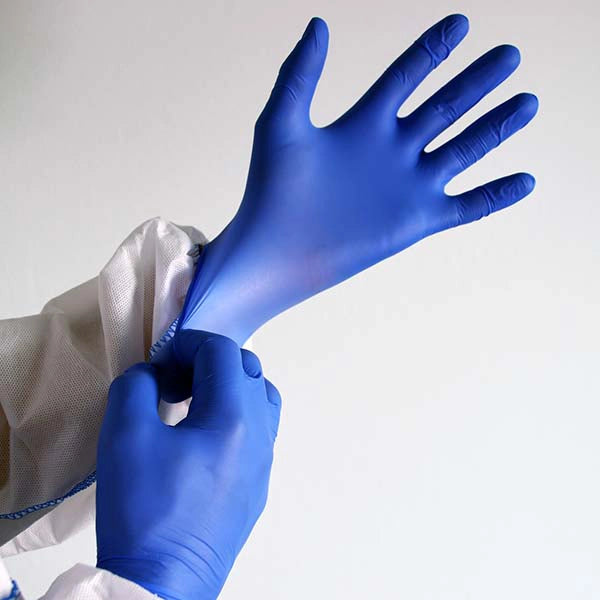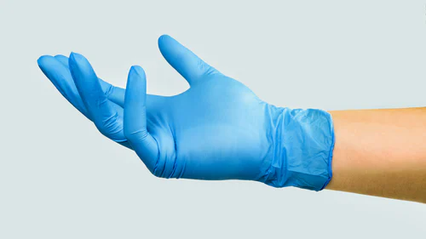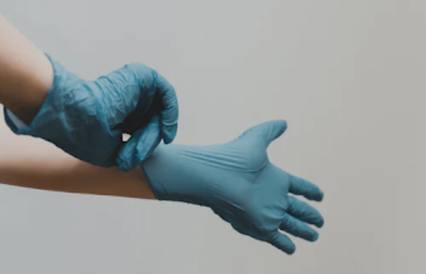Dental gloves are worn by dentists and dental hygienists to protect their hands from infection and disease.
Of course, dentists want their patients to have a happy and healthy dental experience. As a dental practitioner, how can you do this? By protecting yourself first. Save your hands, so you can save others.
Dentist gloves are one of the most important pieces of equipment that you will need in your clinic. The reason for this is because they protect you and your patients from harmful germs and bacteria that can be found in saliva and blood. This article will look at the different types of dentist gloves, why they are important, and how to use them properly.
What are Dental Gloves?
Disposable gloves for dental operations and professional cleanings are available in both ambidextrous and hand-specific styles. For ambidextrous gloves, the fit is made for both hands. They are created with the thumb placed in line with the other fingers.
Hand-specific gloves allow the thumb to rest in its natural position, reducing unnecessary stress. They are often known as right and left gloves and are manufactured in a range of sizes.
Dentist gloves are available in a wide range of colors. Feel free to let your own sense of style guide you. Some dentists prefer to stick with a professional look and choose white or blue. Whatever you decide, make sure to present a professional image.
What are Dental Gloves Used For?
Gloves protect your hands from infection when encountering patient blood and saliva-soiled oral tissues on tools and equipment. They also minimize the possibility of germs being passed on to patients during surgical procedures or treatments. They are an important part of dental health care overall.
Why are Dental Gloves Important?
To avoid cross-contamination and guarantee patient and clinician safety, dentists and hygienists wear hand protection while they treat patients. Dental gloves protect your hands from all kinds of germs. They will not prevent infection, but they can greatly diminish its chances.
What Gloves are Used in Dentistry?
In dentistry, nitrile gloves are the most popular. Wearing nitrile utility gloves in the dental clinic when handling and cleaning tools or performing patient treatments is recommended. They are puncture-resistant, heavy-duty, and offer more hand protection than thinner gloves.
Why Do Dental Hygienists Need to Wear Gloves?
Dental hygienists handle the same types of materials as other health care practitioners, but they also come into contact with toothpastes, whiteners, dental powder, and other materials that can cause infection.
When Should Dental Gloves Be Worn?
Sterile gloves are necessary for invasive procedures, whereas heavy-duty gloves are needed for dental tool cleaning. In general, dentists and hygienists should wear gloves for any patient care procedures.
Do Dentists Have to Wear Gloves?
Gloves are recommended or required for all patient interactions according to the CDC, ADA, OSHA, and many states dental boards. The American Dental Association and the Association for Dental Laboratory Professionals recommend that dentists wear gloves. All dental health care workers should be vigilant about wearing gloves during patient care procedures.
Do Dental Nurses Wear Gloves?
Protective gear such as gloves are part of routine health measures. Always wear gloves while brushing or flossing a patient's teeth or cleaning dentures. It is very important to ensure that oral health equipment is kept clean at all times.
Do Dental Assistants Wear Gloves?
Yes. Dental assistants are also required to wear gloves because of the possibility of infection or cross-contamination. In the dental clinic, dental assistant gloves are used to protect both clinicians and patients.
Why Do Dental Nurses Wear Gloves?
Gloves are disposable devices worn to protect workers from contamination with blood and other body fluids they may touch. The patient is also protected from any infections passed to them by the dental surgeon or dental nurse. It is highly recommended for dental assistants and hygienists to wear gloves, especially during surgical procedures.
What Does the ADA Recommend?
The ADA encourages dentists and hygienists to wear gloves for patient care procedures. Gloves are recommended for all dental health care workers. You must wear gloves when there is any danger of body fluids being transferred to your skin or clothes.
What Type of Gloves Do Dentists Use?
In the past, dental clinics often use latex gloves. They are biodegradable, extremely sensitive, and elastic with a close fit. Due to the prevalence of latex allergies, these allergic reactions may occur rapidly, which can provide problems for dental patients.
Even dentists and dental hygienists may be allergic to latex, and using latex gloves in the clinic will make that battle more difficult. On the other hand, latex gloves are reasonably priced but are difficult to see rips and punctures. Latex is also chemically vulnerable and quickly degraded.
Latex gloves are excellent for certain jobs, but dentists may want to consider an alternative due to the health risks of latex allergies. Nitrile gloves are an excellent alternative to latex.
Do Dentists Use Nitrile Gloves?
Disposable nitrile gloves are quickly becoming the favorite in dental offices, replacing latex gloves, which were previously the industry standard. Their high-end safety, excellent puncture resistance, and quicker donning and doffing make them the best of the best.
Disposable nitrile gloves are synthesized from a synthetic rubber compound, and they offer a greater variety of applications. Dental professionals and patients who have latex allergies may consider using these gloves since they resist numerous solvents, chemicals, and will stay on better.
The most distinct characteristic is that a puncture or rip is immediately apparent, safeguarding all patients and staff. Additionally, the Food and Drug Administration (FDA) performs a number of tests on these man-made gloves to declare them medical grade.
The synthetic composition of these gloves enables them to have a considerably longer shelf life than natural rubber latex gloves. There are a broad variety of colors available. They can match the décor and color palette of a dental practice easily.
Do Dentists Use Latex Gloves?
Repeated exposure to latex may lead to an allergy to latex. Hand lotions that include oil may dissolve latex proteins, perhaps leading to skin reactions including itching, redness, or irritation. Powdered latex gloves were used in hospital settings until 2017 according to the ADA.
Because natural rubber latex protein was found to mix with the powder when powdered latex gloves were removed, the U.S. Food and Drug Administration (FDA) instituted a ban on powdered latex gloves.
Exposure to the airborne mix may have triggered an allergic response. It is possible that the powder used in latex gloves may cause delayed wound healing and other skin problems.
In addition, individuals who are allergic to specific foods such as tomatoes or apples are more likely to become allergic to latex. Those susceptible to other allergens, such as pollen and mold, may also be allergic to latex.
What Should You Consider If You Have a Latex Allergy?
Latex allergy is a condition caused by the immune system's response to synthetic latex proteins, which may be used to make gloves, medical supplies, and other products.
Hypersensitivity to latex proteins is rarely fatal but may cause contact dermatitis. Symptoms of an allergic reaction include skin rashes, itchiness, or swelling, which are typically itchy or burning sensations.
Do Dentists Use Vinyl Gloves?
Vinyl gloves may be better suited for short-term activities. They have fewer barrier properties, and therefore are best used in low-stress situations with a low risk of exposure to blood, bodily fluids, and other harmful substances.
It is also important to note that vinyl gloves containing extremely poisonous plasticizers, such as diethylhexylphthalate (DEHP), should never be used when touching bodily fluids, blood, or greasy foods. These materials may cause anaphylaxis.
Vinyl gloves are inexpensive, have a long shelf life, and are readily available, but they may not offer protection from highly sensitive applications.
What is Thought to be the Most Critical Piece of PPE in Dental Offices?
Gloves are the most often used PPE equipment. If you're going to perform a dental medical procedure that involves any of the following, use gloves: blood, mucous membranes, bodily fluids, non-intact skin, and the insertion point of a patient's intrusive device.
It is important to wear gloves when handling all of these items. Proper hand protection will help eliminate the risk of spreading blood-borne pathogens to your patients and co-workers.
It is highly recommended to wear gloves when performing deep work like scaling and root planing, and when handling and removing implants. They allow you to extend your reach by covering your fingers as you work.
Do Dentists Change Gloves Between Patients?
It is essential to switch gloves with each patient and at every instance of contact with contaminated surfaces to avoid the spread of infections. During dental operations, it is mandatory for not just the dentist, but all other dental team members to wear gloves according to this study.
Health-care professionals should change gloves after performing an extraction to decrease the spread of infection, as well as before and after any procedure involving blood or other bodily fluids. You should always change gloves between procedures.
Best Gloves for Dentists
Dental exam gloves are thin gloves that are worn on the hands of dental professionals during examinations, dental procedures, and dental work.
Quality dental examination gloves are designed to provide a high level of comfort and fit during both routine and complex medical procedures.
Here is a list of recommended quality disposable glove options with high tactile sensitivity and a superior level of protection against viruses. They are the best nitrile gloves for dentistry on the market today.
Black Nitrile Exam Gloves
The black color nitrile exam gloves protect the wearer from infection, yet are very comfortable to wear. The nitrile material used allows for a tactile sensitivity high enough to feel rough dental anatomy, but can also protect against potentially dangerous bacteria. These black dental gloves are perfect for all dental treatment procedures.
Dark Blue Nitrile Exam Gloves
The dark blue nitrile color exam-grade gloves are great to wear for both dental examinations and clinical procedures. The nitrile material used provides extra protection against contact with blood and other bodily fluids. They are a comfortable alternative to latex gloves.
Blue Nitrile Exam Gloves
The blue color nitrile medical gloves are a favorite with dental health care professionals. They are light in weight, yet very durable and comfortable to wear. High tactile sensitivity is possible because of the tight, smooth fit of the material due to the elastic properties in the glove materials.
Orange Nitrile Exam Gloves
The orange dental nitrile gloves are a great new addition to the market. Not only does the orange color of the gloves signify that they are great as dental hygienist gloves, but they also make a bold fashion statement. They offer excellent barrier performance with adequate protection at an affordable price.
Where Can I Buy Latex Free Dental Gloves Online?
You can buy dentist gloves online from us! We carry a large selection of nitrile latex free gloves in our store. Take a look at our selection at competitive prices, and if you have any questions, please don't hesitate to contact us at Gloves online.
Gloves.com is your source for the best dental gloves online! We offer a 100% Satisfaction Guarantee on all of our products, and we guarantee you will save money! If you have any questions about the products we carry, feel free to contact us by phone or email, and we will be happy to assist you with any needs that you may have.
Dentist Gloves Summary
The importance of dental gloves in dentistry cannot be overstated. Always make sure to use dental utility gloves in order to protect your hands and your clients. It’s not just about protecting yourself; it’s also about protecting others around you.
Want to buy dentist gloves? Click here for our latex free and powder-free gloves.









